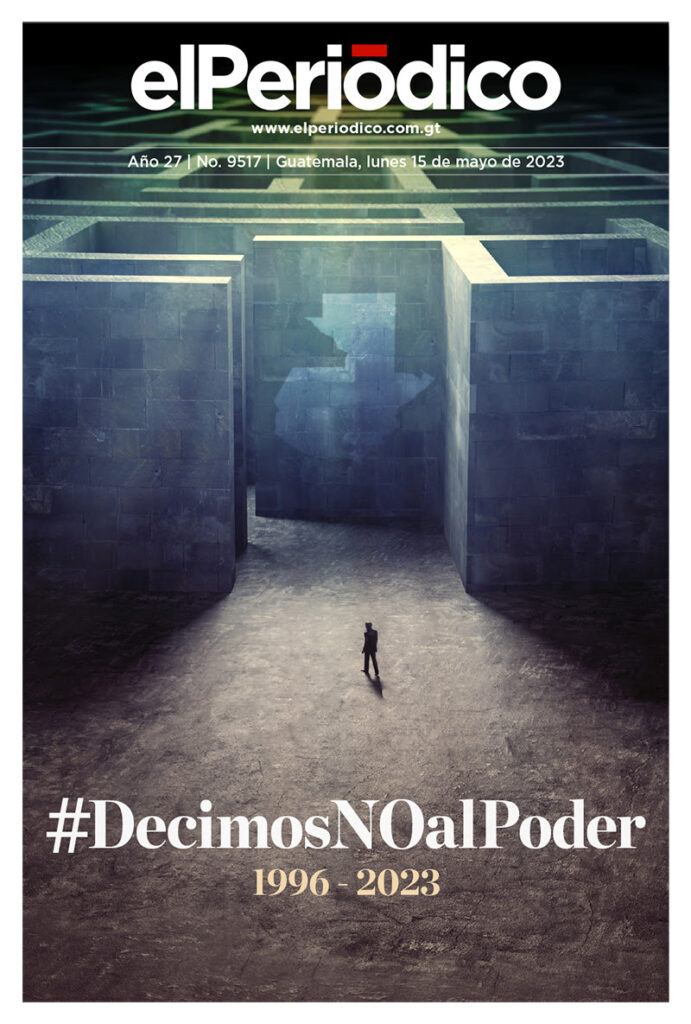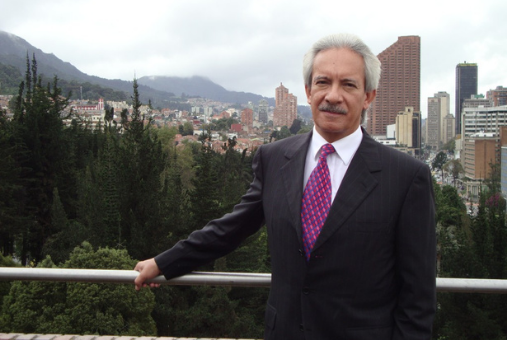With the hashtag #DecimosNOalPoder (We say NO to power), the image of a large labyrinth with the map of Guatemala on one of its walls, and a "Goodbye!", elPeriódico published its last edition this Monday, May 15, and closed the door after almost 27 years.
Its closure, announced on Friday, May 12, was marked by organizations defending freedom of the press and expression – both national and international – as a blow to journalism and democracy in Guatemala.

Primera página de la edición final de elPeriódico publicada el 15 de mayo de 2023. (Imagen: Cortesía elPeriódico)
Despite the shock, its closure did not come as a surprise: the same newspaper had been denouncing constant harassment against it. The “resounding blow,” as reported in a statement on May 12, came with the arrest of José Rubén Zamora – president and founder of the media outlet – on July 29, 2022. He is accused of alleged money laundering in a court case that has aroused suspicion and criticism.
At the time, and according to the newspaper's financial analysis, they thought they would only last two more months. However, "our team resisted 287 days of persecution, political and economic pressures," the newspaper explained.
“We will continue to believe in a fair Guatemala with freedom of expression; a Guatemala where democracy can flourish. Goodbye!” the May 12 announcement concluded.
“The closure of elPeriódico after 26 years of doing great journalism is devastating. Seeing that the persecution of a State eliminates a media outlet for informing its citizens is aberrant in a democracy,” José Zamora, son of José Rubén and communications director of Exile Content Studio, told LatAm Journalism Review (LJR).
“The simple fact of doing journalism, investigating and denouncing corruption should not be criminalized. 166 exceptional professionals have lost their jobs, and Guatemalans lose an important source of information. At the same time, it gives hope to see that all journalists in Guatemala are more united than ever and continue to do everything in their power to inform Guatemalans," he continued.," he continued.
In what was his last column on May 15, José Rubén Zamora recounted what has been "30 years of tireless fight against corruption, impunity and drug trafficking, against abuses of power, State terrorism, exclusion and misery, in favor of freedom,” among other things.
Zamora also highlighted the contribution that the media outlet had in terms of employment (400 in 2012, its best moment), and thanked everyone who continued to support the newspaper: shareholders, advertisers, suppliers, the independent press, its audience, and especially its newsroom.
“Above all, touched and very moved, my admiration, affection, respect and appreciation to my exceptional colleagues of the extraordinary newsroom and administration of our humble and modest newspaper, which, nevertheless, with its irreverence and commitment to the truth, made 10 government regimes in a row tremble and shake,” Zamora said.
“Our leadership in investigative, opinion and cultural journalism remains in history. Specifically, we left as a legacy during the regime of [Alejandro] Giammattei alone, more than 200 rigorous and well-documented journalistic investigations, which show the exponential level that corruption has reached in the institutions of the State of Guatemala,” the journalist continued.
Zamora also pointed out the irregularities in the justice system that he said prevents the exercise of freedom of expression in the country and due process from being guaranteed.
“Despite the fatigue, the severe adverse conditions, the humiliation and the derision, I will not cease in my fight for freedom and democracy in Guatemala. Without press freedom, there is no democracy," Zamora concluded, signing along with his location — "Bartolina #2, isolated section, Mariscal Zavala [prison].”
The reactions to elPeriódico's closure started rolling in on Friday, May 12. Organizations defending press freedom agree on the danger posed by the closure and on the intimidating message delivered to other media outlets.
"The closure of any media outlet is tragic news for community life when we aspire to coexist as diverse societies and process disagreements with more information and opinions," Pedro Vaca, Special Rapporteur on Freedom of Expression of the Inter-American Commission on Human Rights (IACHR), told Prensa Libre.
In September 2022, the Office of the Special Rapporteur published a statement reminding Guatemala of its obligation “to fully and effectively guarantee the rights to freedom of expression and of the press.”
Among the cases mentioned, the Office of the Special Rapporteur made reference to the arrest of Zamora and of the financial director of the media outlet, Flora Silva, and recalled the validity of the precautionary measures that the IACHR granted Zamora in 2003. It also said it requested a “working visit to verify Zamora's situation.”

José Rubén Zamora, periodista guatemalteco, fundador y director de elPeriódico. El próximo 29 de mayo cumple 10 meses en prisión. (Foto: Cortesía)
In the recent interview, Vaca reiterated his intention to visit Zamora in prison, but assured that he has not received a response from the State of Guatemala despite having sent dates on which it could be done.
The Inter-American Press Association (IAPA) also lamented the closure of elPeriódico, which it described as "a step backward for democracy" in Guatemala.
“It is the essential task of the independent press to scrutinize the public powers. For this reason, we deeply lament that Guatemala is losing a media outlet that has played an essential role for many years due to the legal, judicial, and economic pressure to which it was exposed,” Michael Greenspon, IAPA president, said, according to the association’s statement.
On its Twitter account, the Committee to Protect Journalists (CPJ), lamented the closure, expressed solidarity with the newspaper’s journalists and recalled the repeated denunciation that the organization has made due to “the constant harassment of elPeriódico.” It also called for the immediate release of José Rubén Zamora.
The International Center for Journalists (ICFJ) said it was “devastated that, due to government pressure, elPeriódico has been forced to close.” It added that José Rubén Zamora “also remains behind bars unjustly.”
Juan Pappier, Americas acting deputy director at Human Rights Watch, called the closure "a heavy blow to the fight for democracy and press freedom in Central America."
In Guatemala, a group of people stationed themselves outside the Supreme Court of Justice to protest against the closure of the outlet. According to the collective Festivales Solidarios, the protesters are speaking out for the "murder of elPeriódico, one of the media outlets that for years dismantled and investigated several governments," the newspaper published.